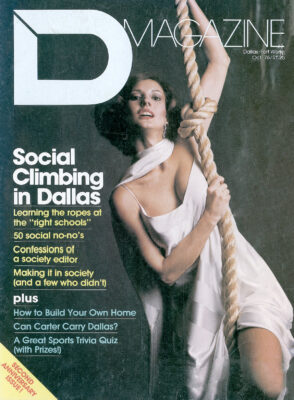Society runs the arts in Dallas. The question is, does it hurt more than it helps?
Let us accept the fact, immediately, that the arts, at the public level, would not be where they are in Dallas were it not for Society – Society with a capital S. Or, put another way, capital S for Social Climbing, because there is also no question that most of the leadership in the arts, male and female, is not devotion to an esthetic, it’s personal ambition: leadership carries social status, puts you in a position to make public pronouncements on a variety of topics, and gives you the ability to command the appearance of performing stars at your parties. It beats hell out of playing the piccolo. It even gets to being an assignment situation – “You take the symphony for a few years, she’ll go to the museum, he wants to retire.” One notable leader, fresh from several years on another arts assignment, has quietly announced plans to take over Channel 13 when Ralph Rogers gives it up. But such support (because there’s always a nice piece of change involved) and guidance of the Dallas Symphony, the Museum of Fine Arts, Dallas Civic Opera, and the Theater Center, to name some majors, has enabled these organizations to take root and survive. But has such control blunted their artistic thrust and slowed advancement?
Those who have given months or years of time and thousands of dollars dismiss the idea. “It’s very simple,” an active supporter-guide of the Dallas Symphony says, “without society, if you want to call it that, Dallas wouldn’t have a symphony orchestra. I know about the Symphony. As for the other arts, I can make an educated guess: Dallas wouldn’t have them either.”
The artists generally have quite a different view. “Nonsense,” a first chair symphony player retorts, “Dallas could have a symphony orchestra without the kind of leadership it gets. The problems have come because lay persons tried to run an artistic enterprise. The people who run the Dallas Symphony don’t know, or care, about music. They approach everything as a business or a public relations undertaking. They just want to give parties and balls so they can get their names in the paper. I could name you a couple of names who have hurt music in Dallas more than any five directors or unions. . .yet these people are referred to as the ’saviors’ of the Dallas Symphony.”
The Dallas Museum of Fine Arts has received a great deal of public criticism recently for having such a social control. A Dallas painter, not one of the public dissenters, claims the museum is “a social toy run by Highland Park that the rest of us in Dallas pay for.” Museum leaders point out that none of the presidents of late or the artistic directors has lived in the Park Cities. Socially, it’s a different matter. Says a former Beaux Arts ball chairwoman (from Highland Park), “Who do you think buys the $100 tickets?” A painter sneers, “Art museum? It’s a social game. Nobody cares about the art just so the name’s well known. It’s a way you score.”
“Of course it hurts the arts,” says a Dallas critic, “art is skill and human ingenuity, not social graces and personality. Art isn’t capable of developing past the status quo stage when it’s run by people with one eye on the box office and the other on Monday’s society pages. You notice how little native artistic talent you see in Dallas, the eighth largest city in the U.S.? Talent means nothing to the social leadership crowd.” Someone with long social association with arts dismisses the argument: “It would be good if musical matters could be left up to musicians and paintings to painters and arias to the sopranos. But you can’t do it. Nobody’s ever been able to do it, because the artistswant to be recognized and get paid toshow off. We give ’em the place and themeans – so we’re going to call the shots.”
Related Articles

D CEO Award Programs
Winners Announced: D CEO’s Financial Executive Awards 2024
Honorees in this year’s program include leaders from o9 Solutions, Baylor Scott & White, and Texas Capital, as well as our Constantine ‘Connie’ Konstans Award winner Mahesh Shetty of ILE Homes.

Basketball
What We Saw, What It Felt Like: Mavs-Clippers Game 2
A gritty game draws Dallas even in the series.
By Iztok Franko and Mike Piellucci

Baseball
What Should We Make of the Rangers’ Accidental Youth Movement?
It's been 26 years since a defending World Series champion leaned on this many young players out of the gate. In Texas' case, that wasn't the plan. But that doesn't make an influx of former first-round picks a bad thing, either.


